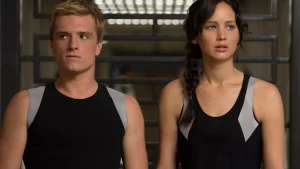Starving for Summer in 2012
A Film Review of The Hunger Games
By: Lawrence Napoli
Is Hollywood land trying to make March the new beginning of the summer blockbuster season? The reason I ask is because the hype that has preceded The Hunger Games is very close to rivaling The Avengers and The Dark Knight Rises. However, hype alone, does not a successful blockbuster make. It must have story, it must have intrigue, it must have star power and it must have spectacle. The Hunger Games has all these and one more x-factor worthy of identifying: it has a major draw for young women 13-21. Oh yes ladies and gentlemen, the woman’s blockbuster is here to stay and it’s doing something its previous manifestations have not. Titanic (1997) and the Twilight Saga (2008) raked in the cash thanks in most part to droves of young women making multiple runs to the cinema, but those films largely appealed to classic romanticism of heterosexual feminine tendencies by featuring good looking young men as the main characters who were equal parts strong and understanding. The Hunger Games, on the other hand, taps directly into girl power featuring a young woman as the protagonist who has an incredible ability to inspire young women in addition to men in a very leveled, respectable, non-cheesy or over-sexualized manner akin to Angelina Jolie’s Lara Croft: Tomb Raider (2001).
Young adult novels seem to be Hollywood’s second favorite gold mine of creativity next to comic books. This trend worries me seeing how Hollywood is looking for every excuse on Earth to not have to generate original content. However, if executed properly, the adaptation can still be wonderfully entertaining. I found this to be the case for The Hunger Games despite not having read the books or knowing anything about the mythos. That does not mean I found the story to be a flawless presentation. Quite the contrary, the screenplay was riddled with plot gaps, glaze-overs and incomplete/irregular explanations. This film attempts to present some generalized global conflict as the situation that necessitates the existence of said “Hunger Games” as a means of maintaining law and order. Simply put, a few lines of text narrated by Donald Sutherland before the movie began was quite pathetic, and did nothing to lay out the social desperation facing the individual districts of what we presume is the former United States. As an extension to that criticism, “hunger” itself is never developed as a specific plight on the populace, rather, a coincidence of extreme poverty and under-development, thus explaining how District 12 (at least) is a bit of an Amish paradise.
The script by Gary Ross and Suzanne Collins fails at establishing the boundaries of this fictional world, but where it succeeds is in every scene that features Katniss Everdeen (our heroine) as a young woman well beyond her years in terms of responsibility, tact and boldness. Every scene the audience bears witness to endears them further to Katniss as a character because her actions and words are prototypically good without being “goody two-shoes.” Katniss needs to be tough in this unforgiving world, and has no problem making life and death decisions, but I feel she is written as almost too good at times. Every decision she makes (even the one that lands her into trouble in the first place) always seems to work out with very minimal personal sacrifice. I attribute this convenience to her “beginner’s luck” in taking the first steps in the transition from District 12 nobody to global symbol of hope and victory. I fully expect the follow up films to The Hunger Games to involve more cerebral/personal struggles for Katniss beyond strangers that want to murder her because seeing how the hero reacts to failure demonstrates true character. Regardless, this film pulls out all the stops to make you love Katniss for her innocence, her irreverence and her ability to adapt.
Visual effects in The Hunger Games are nowhere close to being on the same level as Twilight, let alone Harry Potter. Granted, this film doesn’t involve super-powered freaks or magic, but it does feature a stark contrast in technological prowess between the worlds of “The Capitol” and “District 12.” For instance, a hover train is used to transport our protagonists to where their fates are to be determined, but it was seen only briefly from an aerial angle and at a great distance. I feel that closer shots or dynamic pans and tilts to showcase the train would have left the audience at the same loss for words as Katniss herself upon boarding and traveling on such a marvel. Then there was the “are they organic or are they digital” monster dogs towards the end of the film that weren’t particularly well detailed in any way which reminded me of the atrociously generic “hulk dogs” from Ang Lee’s failed adaptation of Hulk in 2003. The one impressive example of visual effects was the “clothes on fire” effect used on two separate occasions to (once again) make Katniss more attractive to both her virtual audience and the real one in the theater.
For a film that is meant to be about something as controversial as children killing children (for any reason), this film is surprisingly light on the action. Of course, there is a very good reason for this, and it revolves around the fact that this film is rated PG-13. With most of the kills happening off camera, and the ones that are seen being displayed exclusively in extreme close-ups, there really isn’t much combat displayed on the screen. If the audience was shown this level of violence from medium shots and wide angles, this film gets an R rating — oh and by the way, loses all that filthy, ridiculous money it made on its opening weekend. All of the violence and brutality is more implied rather than plainly observed, and that hurts the pacing of this film. Perhaps the book paints a more thrilling fight for survival, but what the audience observes is more of a deadly game of hide and seek with an over-emphasis on the hiding. Viewers beware: This is the unfortunate effect that the business of Hollywood has on the fiction of Hollywood which often results in the declawing of more dangerous (and interesting) source material. If The Hunger Games film franchise wants to make the same kind of waves the novels did, the violence and the action must be upgraded.
I was astounded at the amount of A-list talent attached to this picture outside of the teen-looking main characters. Stanley Tucci, Elizabeth Banks, Donald Sutherland and Woody Harrelson all have small, supporting roles in the same manner the adult thespians that populated the Harry Potter films supported its up and comers. They all did fine jobs with extremely limited opportunities to shine, but the one marquee talent that left the biggest impact in terms of performance was the one not considered an actor in the first place: Lenny Kravitz as “Cinna.” Yes, you read that correctly. This rock and roller plays an image/fashion consultant to Katniss to aid her in playing the game outside the game of survival: gaining sponsors for third party aid inside the kill zone. No other character embodies an adult’s perspective on the games as both compelling and barbaric. Kravitz displays full confidence in his character’s experience in giving his “tributes” the best chances to survive while developing a genuine concern for Katniss as more than a sacrificial lamb. His performance is so genuine that every line he delivers to Jennifer Lawrence feels like he is speaking to his actual daughter, Zoe, in real life. This positive relationship is so vital for The Hunger Games because rich adults and poor children are clearly at odds in this unforgiving, fictional world, whether the children realize it or not.
Josh Hutcherson’s performance as Peeta, the romantic interest/co-tribute of Katniss does a fine job of complimenting her as a character. Clearly, the role of Peeta is designed to develop a degree of stereotypical role reversal to his female counterpart. Peeta wears his emotions on his sleeves, is more artistically attuned, is easier to talk to and is slightly less courageous than Katniss. Josh excels in not overplaying the degree of “weakness” his character shares in relation to Katniss which is vital in maintaining the credibility of “girl power” in this film. Peeta’s true strength lies in his sense of self and his limitations, and Josh relays this with an everyman’s candidness that only results from decent chemistry with his costar. The one criticism I have for Josh, is the same I have for Ms. Jennifer Lawrence: The romantic sparks don’t exactly sizzle between them in this film, but then both actors were born in the 1990s. Take that observation for what it’s worth. A greater sense of comfort with each other should yield a more rewarding (and less awkward) relationship on the screen in subsequent sequels.
As for Jennifer Lawrence, I can say with full confidence that she is the queen of 2012’s blockbuster films. Her breakout performance in Winter’s Bone (2010) yielded an Academy Award nomination for a performance in a leading role. What’s interesting to note is that her character in that film is eerily similar to Katniss in The Hunger Games. Both are stuck in the wilderness, both behave as parents to their parents, and although they are victims of circumstance, they take steps to do something about it. Jennifer Lawrence defines confidence and command, and had she played Mystique as thus in X-Men: First Class, that character would have been more compelling than a jealous bimbo straight out of the valley. But I digress. Few young, American actresses could do the character of Katniss Everdeen justice without making her something she is clearly not. Amanda Seyfried would make Katniss too sexy, Anne Hathaway would make Katniss too old, Amanda Bynes would make Katniss too goofy, Blake Lively and Megan Fox would be laughed at, Hayden Panetierre is too perky, and Kristen Stewart is too homely. Jennifer Lawrence is just right because not only is she beautiful, but she actually has talent, and her appeal in The Hunger Games is refreshingly unisex.
True girl power is not the concept of women simply being stronger than men; it is women showing an ability to surpass men on neutral ground (literal or figurative) without handicaps on either side. Jennifer Lawrence and The Hunger Games represent Hollywood’s best attempt to present this idea as a blockbuster in recent memory. I identify with Katniss not as someone I’d like to have sex with (i.e. the way Hollywood pushes women 99.9% of the time), but as an anonymous nobody that does the best she can with what she’s got and be damned if anyone else tells her otherwise. I respect that idea because I strive for it. In this day and age, where so many powerful forms of suggestion pervade our thoughts and minds, a little reminder about the strength of an individual’s will can be quite moving and empowering. And guess what? Women can make this idea just as inspiring as men, just not G.I. Jane (1997).







